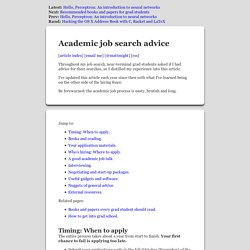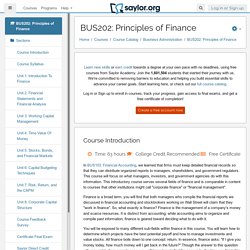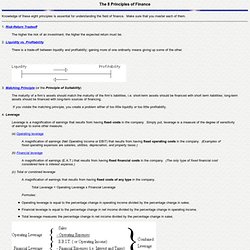

ULPT: How to dispute medical debt the right, effective way. LPT deleted me because it's a "legal" thing but this is actually a life pro top with a shade of shady in here so I guess it fits better here anyway. : UnethicalLifeProTips. Academic job hunt advice: Tips for searching for and landing a professorship. Jump to: Related pages: Timing: When to apply The entire process takes about a year from start to finish.

Your first chance to fail is applying too late. Submit your applications early in the fall (October/November) of the year prior to which you want to begin employment. Books and reading An academic job search is somewhat like a tightly choreographed ritual dance between candidates and schools. Even a Geek Can Speak. Your application materials You'll find that Tomorrow's Professor has good general advice on composing your job materials: cover letter, CV, research statement and teaching statement. Who's hiring: Where to apply cra.org has the best listing for academic jobs related to computing.
A good academic job talk One department chair told me, "Your packet got you the interview. Saved my job talk. Interviewing Don't let the one-on-one interviews be one way. If you're at a loss for questions, try these: Why did you choose this school during your job search? Useful gadgets and software. The Chronicle: Salary Data. Wealth, Inheritance and the Estate Tax. Wealth in the United States is quite mobile, and many variables account for the fact that some families reach retirement far richer than others.

Aside from inheritances, past empirical work indicates that three other factors determine wealth:11 Acquired skill differences, which are determined by education, entrepreneurship, hard work and other factors that help individuals attain income and wealth; Marital sorting, which reflects the tendency of individuals with similar levels of acquired skills to marry each other; and "Inherited skills" - the innate intelligence passed down from one's parents and habits nurtured in childhood (such as disciplined work habits).
The effect of each of these factors on the distribution of wealth can be estimated through computer modeling, as the following discussion will show. “Personal choices, innate intelligence and nurturing families determine wealth.” Modeling Factors That Determine Wealth. Consider the contribution of labor income to bequests. Research and Ideas for Shared Prosperity. BUS202: Principles of Finance. Purpose of Course showclose In BUS103: Financial Accounting, we learned that firms are required to keep detailed financial records so that organized reports can be distributed to managers, shareholders, and government regulators.

Principles of Finance will focus on what these managers, investors, and government agencies do with this information. It is an introductory course to various fields of finance and is comparable in content to courses that other institutions label as “corporate finance” or “financial management.” Finance is a broad term; you will find that both managers that compile the financial reports we discussed in financial accounting and stockbrokers working on Wall Street will claim that they work in finance. So what exactly is finance? In this course, you will be exposed to a number of different sub-fields within finance. Course Information showclose.
SocialPace. Principles of Finance. Knowledge of these eight principles is essential for understanding the field of finance.

Make sure that you master each of them. 1. Risk-Return Tradeoff The higher the risk of an investment, the higher the expected return must be. 2. There is a trade-off between liquidity and profitability; gaining more of one ordinarily means giving up some of the other. 3. The maturity of a firm’s assets should match the maturity of the firm’s liabilities, i.e. short-term assets should be financed with short term liabilities; long-term assets should be financed with long-term sources of financing.
If you violate the matching principle, you create a problem either of too little liquidity or too little profitability. 4. Leverage is a magnification of earnings that results from having fixed costs in the company. (a) Operating leverage A magnification of earnings (Net Operating Income or EBIT) that results from having fixed operating costs in the company. (b) Financial leverage (c) Total or combined leverage. Principles of Finance. Principles of Finance. Finance.
Real Estate.